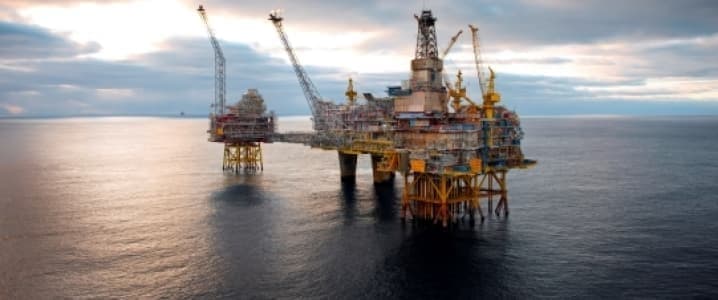Business
Norway Thrives in North Sea Oil While UK Faces Decline

The United Kingdom and Norway are charting distinctly different courses in managing their oil and gas resources in the North Sea, with significant implications for their energy futures. While Norway continues to expand its production and exploration efforts, the UK is grappling with declining output and investment due to regulatory and tax uncertainties. This divergence is becoming increasingly pronounced as the decade progresses.
Norway has emerged as a dominant player in the North Sea, recently becoming Europe’s leading gas supplier and consistently auctioning exploration licenses. According to Tom Erik Kristiansen, an energy specialist at Pareto, the support for the oil and gas industry in Norway has remained strong across major political parties. Kristiansen noted, “There is a huge difference between the two countries’ approach and it has become bigger over the past five years.” In contrast, the UK has seen fluctuating policies that have caused many investors to withdraw.
For decades, the Norwegian government has championed the oil and gas sector, recognizing its essential role in job creation and economic stability. Norway is not only focused on its North Sea resources but is also exploring opportunities in the Norwegian Sea and the Barents Sea. Recently, the government announced plans for its 26th oil and gas licensing round in less-explored areas, aiming to boost exploration before a projected decline in production begins in the early 2030s.
The fiscal landscape is significantly different in Norway. Companies can recover 71.8% of exploration losses, providing an attractive incentive for investment. While taxes in Norway are relatively high, they have remained stable since the 1990s, offering operators the long-term predictability they seek. This contrasts sharply with the UK, where the tax regime has shifted annually since 2022, leading to a climate of uncertainty that has driven companies away.
Since the introduction of the Energy Profits Levy in 2022, aimed at taxing windfall profits during the energy crisis, UK oil and gas firms have expressed concern over the lack of regulatory stability. The recent Labour government’s changes have further exacerbated this situation, with the removal of a 29% investment allowance on oil and gas operations, prompting an exodus of companies from the region.
The consequences are stark. According to energy consultancy Wood Mackenzie, the UK is poised to experience its first year without any exploration wells in the North Sea since 1960. This decline in activity threatens the UK’s energy security, as it becomes increasingly reliant on imports.
As investment dwindles, production levels in the UK have dropped by 40% over the past five years and are projected to halve again by 2030, according to the UK’s offshore energy industry association, OEUK. The situation has prompted major companies to reconsider their operations. For instance, U.S. oil producer Apache announced plans to cease oil production in the UK North Sea by 2030, citing unmanageable investment risks due to the changing regulations.
In a significant setback for the UK energy sector, Ineos Energy also halted its UK investments this summer, calling the current tax regime “the most unstable fiscal regime in the world.” The chairman of Ineos Energy, Brian Gilvary, emphasized that the UK’s over-regulation and negative political climate toward oil and gas create barriers for potential investors.
With discussions ongoing about the future tax regime and the potential for new licenses, the UK government’s approach will be critical to reversing its declining fortunes. The OEUK has called for a more stable, profits-based tax system to encourage investment and ensure resources are fully utilized.
In contrast, Norway remains focused on maintaining its status as a reliable supplier of oil and gas to Europe. Energy Minister Terje Aasland reaffirmed the government’s commitment to the sector, stating, “Norway wants to be a long-term supplier of oil and gas to Europe, while the Norwegian continental shelf will continue to create value and jobs for our country.”
Norway’s strategy is supported by its Government Pension Fund Global, often referred to as ‘Norway’s oil fund,’ which has amassed approximately $2 trillion in assets, representing one of the largest sovereign wealth funds globally. This fund was established using revenues from the oil and gas sector, underscoring the significant economic impact of the industry.
As the UK races against time to revive its oil and gas sector, Norway’s proactive measures position it well for future growth. Both countries serve as contrasting case studies in energy management, highlighting the critical role of stable regulations and investment strategies in shaping national energy outcomes.
-

 Entertainment1 month ago
Entertainment1 month agoAnn Ming Reflects on ITV’s ‘I Fought the Law’ Drama
-

 Entertainment2 months ago
Entertainment2 months agoKate Garraway Sells £2 Million Home Amid Financial Struggles
-

 Health1 month ago
Health1 month agoKatie Price Faces New Health Concerns After Cancer Symptoms Resurface
-

 Entertainment1 month ago
Entertainment1 month agoCoronation Street’s Carl Webster Faces Trouble with New Affairs
-

 Entertainment1 month ago
Entertainment1 month agoWhere is Tinder Swindler Simon Leviev? Latest Updates Revealed
-

 Entertainment2 months ago
Entertainment2 months agoKim Cattrall Posts Cryptic Message After HBO’s Sequel Cancellation
-

 Entertainment2 months ago
Entertainment2 months agoMasterChef Faces Turmoil as Tom Kerridge Withdraws from Hosting Role
-

 Entertainment3 months ago
Entertainment3 months agoSpeculation Surrounds Home and Away as Cast Departures Mount
-

 World1 month ago
World1 month agoCole Palmer’s Mysterious Message to Kobbie Mainoo Sparks Speculation
-

 Entertainment1 month ago
Entertainment1 month agoITV’s I Fought the Law: Unraveling the True Story Behind the Drama
-

 Entertainment4 weeks ago
Entertainment4 weeks agoCaz Crowned Winner of The Great British Sewing Bee, Overjoyed by Triumph
-

 Entertainment2 months ago
Entertainment2 months agoMarkiplier Addresses AI Controversy During Livestream Response



















